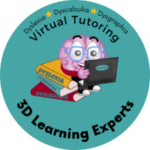As the back-to-school season approaches, parents everywhere are preparing for a fresh academic year. But for parents of children with learning challenges like Dyslexia, Dyscalculia, and Dysgraphia, the process requires extra planning and support. Navigating increased reading assignments, more advanced math problems, and new teachers can be daunting—both for students and their families.
With the right preparation and tools, however, this transition can become smoother and more manageable for your learner.
Making Back-to-School Easier for Students with Learning Challenges
1. Acknowledge and Address Anxiety
It’s natural for students, especially those with learning differences, to feel anxious about returning to school. Whether it’s a fear of falling behind or nervousness about new social dynamics, these feelings are common. Opening up a dialogue with your child can go a long way in easing their worries.
- Encourage your child to express their thoughts and concerns.
- Provide reassurance by highlighting their strengths and the progress they have made.
- Remind them that they are not alone in their struggles—many other students face similar challenges.
By giving your child a safe space to share their feelings, you are helping to reduce their anxiety and build their emotional resilience for the upcoming school year.
2. Communicate with Teachers Early
One of the most effective ways to ensure your child has a successful school year is by establishing open communication with their teachers before the first day of school. Teachers who are informed about your child’s learning challenges—such as Dyslexia, Dyscalculia, or Dysgraphia—can better support them throughout the school year.
Discuss your child’s Individualized Education Plan (IEP) or 504 Plan, outlining the specific accommodations that will help them succeed. Some useful accommodations include:
- Extended time for assignments and tests
- Use of assistive technology, such as text-to-speech software or calculators
- Breaking assignments into smaller, manageable steps
Being proactive ensures that the teacher has time to implement these strategies before challenges arise.
3. Invest in Learning Tools
Technology has opened up new opportunities for students with learning challenges, making once-difficult tasks more accessible. For students with Dyslexia, audiobooks and text-to-speech software can be life-changing. Audiobooks allow your child to follow along with assigned reading at their own pace, helping them improve vocabulary and comprehension while reducing the frustration of decoding words.
Similarly, students with Dyscalculia can benefit from using interactive math apps that break down complex problems into simpler steps. Tools like visual math aids or specialized calculators help to strengthen their grasp of mathematical concepts, giving them the confidence to tackle more advanced material.
- Dyslexia Tools: Audiobooks, text-to-speech software, and note-taking apps.
- Dyscalculia Tools: Interactive math apps, visual aids, and specialized calculators.
- Dysgraphia Tools: Typing programs and speech-to-text software.
Incorporating these tools into your child’s daily routine can significantly improve their ability to engage with the curriculum.
4. Establish a Supportive Routine
Structure and consistency are key for students with learning challenges. A clear, supportive routine can help reduce stress and provide the stability they need to thrive. Start by creating a dedicated study space at home, free of distractions. Break up homework into manageable chunks, and use visual schedules or timers to keep your child on track.
- Establish a regular homework time each day.
- Create a calming environment for studying, with minimal distractions.
- Break assignments into smaller tasks and use timers to focus on one task at a time.
Helping your child manage their time effectively will allow them to approach their schoolwork with greater confidence and less overwhelm.
5. Seek Professional Tutoring Support
Sometimes, the best way to support your child’s academic progress is by enlisting professional help. A specialized tutor can provide targeted instruction in areas where your child struggles most, whether it’s reading, writing, or math. Our virtual tutoring programs are designed specifically for students with Dyslexia, Dyscalculia, and Dysgraphia.
Our highly-trained tutors utilize the Orton-Gillingham approach, a multisensory method proven to help children with reading, spelling, and writing difficulties. Whether your child needs help with decoding words, understanding math concepts, or improving their handwriting, our one-on-one virtual sessions provide personalized guidance to meet their unique needs.
Benefits of Online Tutoring with 3D Learning Experts:
- Convenient and Flexible: Schedule tutoring sessions that fit your family’s busy calendar.
- Expert Guidance: Our tutors are specially trained to work with children who face learning challenges.
- Proven Methods: We use evidence-based approaches like Orton-Gillingham and multisensory techniques.
- Tailored Instruction: Each tutoring session is personalized to meet your child’s learning style and academic goals.
Start the School Year Strong
Starting the school year off right is crucial for long-term success. With the right preparation, tools, and support in place, your child can feel more confident and capable. We’re committed to helping students with Dyslexia, Dyscalculia, and Dysgraphia thrive in the classroom.
Don’t wait until challenges arise—set your child up for success now by enrolling in our virtual tutoring services. Our expert tutors are ready to provide the support your learner needs to overcome their academic struggles.
Ready to make this school year a success? Contact 3D Learning Experts today to schedule a consultation and discover how our specialized tutoring can help your child reach their full potential!

